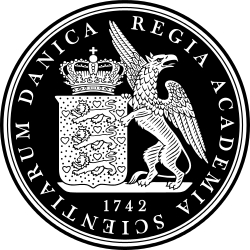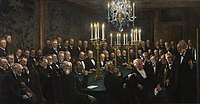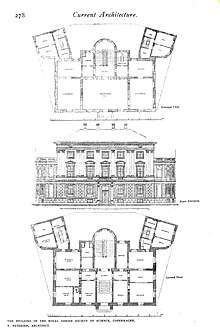Royal Danish Academy of Sciences and Letters
The Royal Danish Academy of Sciences and Letters (Danish: Kongelige Danske Videnskabernes Selskab) is a Danish non-governmental Science Academy, founded in 1742 for the advancement of science in Denmark. It is based in the Carlsberg Foundation's building at the corner of H. C. Andersens Boulevard and Dantes Plads in central Copenhagen.
Kongelige Danske Videnskabernes Selskab | |
 | |
The building on H.C. Andersens Boulevard. | |
| Formation | 13 November 1742 |
|---|---|
| Founders | Johan Ludvig Holstein Hans Gram Erik Pontoppidan Henrik Hielmstierne |
| Type | Non-governmental |
| Legal status | Academy |
| Purpose | The advancement of science |
| Headquarters | Copenhagen, Denmark |
President | Mogens Høgh Jensen |
| Website | www |
History

The society was founded on 13 November 1742 by permission of King Christian VI, as a historical collegium antiquitatum. It was founded by secretary of state Count Johan Ludvig Holstein, and the history professor Hans Gram.
Building

The building at H. C. Andersens Boulevard 35 was designed by Vilhelm Petersen in a Neoclassical style. It was constructed by master mason Christian Wilhelm Rask Licht's company C. Licht.
The Carlsberg Foundation is based in the ground floor while the Royal Academy has the three upper floors. The first floor contains the old meeting hall, where the academy holds their meetings. It is decorated with a large oil painting by Peder Severin Krøyer depicting A meeting in the Royal Danish Academy of Sciences and Letters. There is also a library and rooms for researchers. The second floor contain the academy's secretariate and archives as the president's, general secretary's and editor's offices. The third floor now contains the new meeting room. It was created in the former attic and book storage in connection with an adaption of the building in 1976. Since 2009, it has access to a roof terrace.[1]
Members
Members of the academy are researching, lecturing and publishing in nearly all fields of science. The academy has approximately 250 national and 260 foreign members. In 2011 the division The Young Academy was added, which currently counts 40 young researchers as members.[2]
References
- "Domicile". Carlsberg Foundation. Retrieved 2019-02-28.
- "DUA" (in Danish). DUA. Retrieved 2017-09-22.
Further reading
- Olaf Pedersen, Lovers of Learning - A History of the Royal Danish Academy of Sciences and Letters 1742-1992, Munksgaard, 1992. ISBN 87-7304-236-6.
External links
- Royal Danish Academy of Sciences and Letters
- Digital archive of Matematisk-fysiske meddelelser from the University of Southern Denmark Library